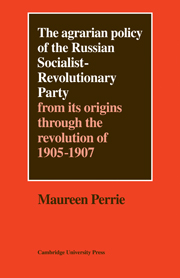 The Agrarian Policy of the Russian Socialist-Revolutionary Party
The Agrarian Policy of the Russian Socialist-Revolutionary Party Published online by Cambridge University Press: 07 October 2011
In his search for assistance from other Socialist-Revolutionary groups, Chernov soon realised just how isolated he was from the prevailing mood of these groups, which were at that time primarily engaged in negotiations with one another to find a common programmatic base for unification. Ideological innovation, in the form of proposals for a renewed emphasis on the revolutionary and socialist potential of the peasantry, was therefore doubly inappropriate to the existing spirit of the Socialist-Revolutionary movement.
Chernov visited Saratov, the major revolutionary centre on the Volga, but received no support there from either of the more influential circles, those of the Rakitnikovs and Argunov. Neither did he receive any encouragement from his contacts with the newly-formed ‘Southern Party’ of Socialist-Revolutionaries, or with the St Petersburg ‘Group of narodovol'tsy’.
In 1899, Chernov's period of administrative exile in Tambov came to an end, and he decided to take the opportunity of going abroad, to study at first hand the latest developments in the Western European socialist movement – which was at that time being racked by the revisionist controversies – and also to seek, in the émigré Populist circles, support for his plans to create an organisation which would coordinate and supply with suitable propaganda literature the groups and individuals working among the peasantry in Russia. En route to Switzerland, he first stopped off in St Petersburg to consult with Mikhaylovskii and the editorial board of his ‘Legal Populist’ journal, Russkoe Bogatstvo (‘Russian wealth’), to which Chernov was beginning to contribute articles.
To save this book to your Kindle, first ensure no-reply@cambridge.org is added to your Approved Personal Document E-mail List under your Personal Document Settings on the Manage Your Content and Devices page of your Amazon account. Then enter the ‘name’ part of your Kindle email address below. Find out more about saving to your Kindle.
Note you can select to save to either the @free.kindle.com or @kindle.com variations. ‘@free.kindle.com’ emails are free but can only be saved to your device when it is connected to wi-fi. ‘@kindle.com’ emails can be delivered even when you are not connected to wi-fi, but note that service fees apply.
Find out more about the Kindle Personal Document Service.
To save content items to your account, please confirm that you agree to abide by our usage policies. If this is the first time you use this feature, you will be asked to authorise Cambridge Core to connect with your account. Find out more about saving content to Dropbox.
To save content items to your account, please confirm that you agree to abide by our usage policies. If this is the first time you use this feature, you will be asked to authorise Cambridge Core to connect with your account. Find out more about saving content to Google Drive.